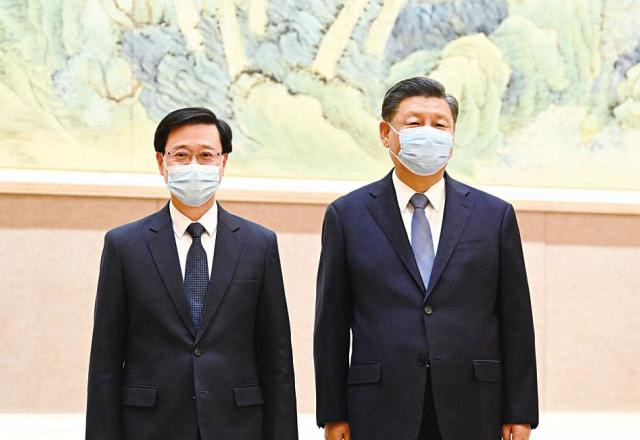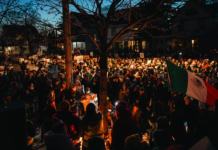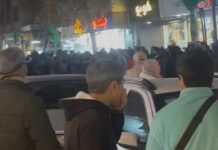John Lee “elected” Chief Executive to continue in Carrie Lam’s bloody footsteps
The so-called election of Hong Kong’s new Chief Executive ended without any surprises on 8 May. As expected, John Lee Ka-chiu, Beijing’s lone candidate, was elected by the “high” ratio of 1,416 votes. That’s 99 percent of the votes in the elitist Election Committee, the highest of any Chief Executive election. All elections since the handover of sovereignty to China have been fake elections decided by the small-circle Election Committee, which is dominated by pro-CCP capitalists. The CCP is China’s so-called Communist Party dictatorship. But the process of this year’s election more clearly reflects the deepening of the counter-revolution against the limited democratic rights of the masses in Hong Kong and shows that direct rule from Beijing has become a fact.
This was the first Chief Executive election since the million-strong protests of 2019, and the implementation of the National Security Law one year later. Last year, Beijing “improved” Hong Kong’s electoral system, further limiting the elected component of the Legislative Council (pseudo-parliament) and also the Election Committee. This was done to prevent the now largely crushed pan-democratic parties from gaining any meaningful opposition in the LegCo. The rule changes do not exclude a small moderate “loyal” opposition from entering parliament to provide a veneer of democracy.
Record low turnout
However, in the Legislative Council elections in December 2021, Beijing took things a step further. All the pan-democratic hopefuls were disqualified. The final election outcome saw a record low turnout of just 30.2 percent, with most voters refusing to participate, and the LegCo was reduced even more to a rubber stamp with no legitimacy among the masses.
In this year’s Chief Executive election, also “improved” by the CCP’s electoral reform, there is no limit to the number of candidates. However, despite this, the CCP didn’t have a lot of options. The election was originally scheduled for 27 March 27. The current Chief Executive, Carrie Lam, had not announced her re-election aspirations as she waited for Xi Jinping’s instructions.
Later, Xian Guolin, a pro-establishment fringe figure and descendant of martial arts master Ip Man, took the lead in running for election. However, in February , on Beijing’s orders, the Hong Kong government announced the election would be postponed until May using the pretext of the Omicron outbreak. In April, Beijing showed its hand. Lam, who had lost Beijing’s support, announced she would not seek re-election and the central government finally expressed its “sole approval” for John Lee’s candidacy.
No room for “disunity”
This wafer thin disguise prevented other establishment factions from throwing their hats in the ring. Obviously, in the new counter-revolutionary situation, the CCP wants to avoid open displays of “disunity” as in the damaging conflict between C. Y. Leung and Henry Tang for Chief Executive in 2012, and John Tsang’s candidacy in 2017. These were all representatives of the pro-CCP capitalist establishment, but their rival ambitions opened a split in the establishment which undermined its authority as a whole. Such incidents can weaken the regime and spur society to challenge its authority.
To guarantee against such embarrassing episodes, Beijing preferred to abolish the whole electoral charade and turn this into the first “one-man election” since the handover. In a show of fealty to Beijing, 300 Election Committee members (one-fifth of the total) rushed to nominate the sole candidate even before his political platform was announced.
Lee previously served as Deputy Commissioner of Police and then as Secretary for Security in Lam’s administration, overseeing the brutal police tactics against the 2019 mass protests. Some people worry that this therefore marks the beginning of “military rule” in Hong Kong. But the state apparatus in Hong Kong is not independent, it is completely under Beijing’s control. Whether a civilian or military official is chosen does not make a fundamental difference, in the end it is the CCP governing Hong Kong.
The general trend of counter-revolution in Hong Kong will only intensify. It will not slow down unless it meets resistance from a mass movement, which most likely will emanate from the working class of mainland China rather than from within Hong Kong under current conditions. It is our analysis that for Xi Jinping to demonstrate his power of nationalist strongman, which he needs to do in the new Cold War, then inevitably he will further subjugate Hong Kong.
The city is anyway firmly in the CCP’s pocket, and given the inexorable decoupling of China and the United States, Hong Kong’s economic and strategic position will decline, and the Western capitalists will basically abandon Hong Kong, turning to more important strategic issues such as the Taiwan Strait and the South China Sea.
“Article 23”
After John Lee was elected, he has already stated that further national security legislation under “Article 23” of Hong Kong’s Basic Law (mini-constitution) will be one of his tasks in office. This will be a more detailed and locally compatible piece of legislation than the National Security Law, which was imposed by Beijing. The aim of new legislation is to allow the authorities to carry out more targeted repression, rather than having to balance between using British colonial-era laws or the “nuclear bomb” of the National Security Law.
The authorities have not eased their crackdown on protesters or pro-democracy activists. According to the Security Bureau, more than 10,000 people were arrested during the 2019 anti-authoritarian movement, of which more than 2,800 have been prosecuted and more than 1,100 have been convicted. Since the passage of the National Security Law, 175 people have been arrested under the law and eight convicted. In May, five trustees of the disbanded “612 Humanitarian Support Fund” were arrested including former pan-democratic legislators Margaret Ng (Civic Party) and Cyd Ho (Labour Party). This was a crowdfunded initiative to cover the legal costs of arrested protesters. The police used the charge under the National Security Law of “collusion with foreign forces”. Ho was arrested on charges of endangering national security, and another individual was charged with failing to register a society for the fund.
It can be seen from this example that even the most moderate pan-democrats are not safe, not because they represent any real challenge to the authoritarian system but in order to slaughter them like “chickens” to scare the “monkey” of mass struggle. Under the onslaught of the CCP-state’s suppression the opposition forces in Hong Kong have almost collapsed. And those that are still functioning have largely chosen to surrender to the CCP. Bruce Liu Sing-lee, chairman of the Association for Democracy and People’s Livelihood (ADPL), a right-wing so-called moderate pan-democratic party, said recently that the party wants to become a “loyal opposition”, believes that “Xi Jinping Thought” is in line with the party’s founding aims (!) and hopes to run for elections in the future. For these professional capitalist politicians, democracy was never a principle, only a means to get votes and official positions.
The fate of Hong Kong is not in the hands of Hong Kong itself, but is dominated by the new Cold War, the political situation in China and worldwide. Therefore, as was already clear during the mass movement of 2019, the anti-authoritarian struggle in Hong Kong cannot be completed in a single city, but must be linked to an intensifying mass struggle in mainland China and must be based on the independent organization and program of the working class – rather than relying on the bourgeois opposition who because they do not want to challenge capitalism. Instead, they limit the development of the struggle and depoliticise it to the point of betraying the movement at




